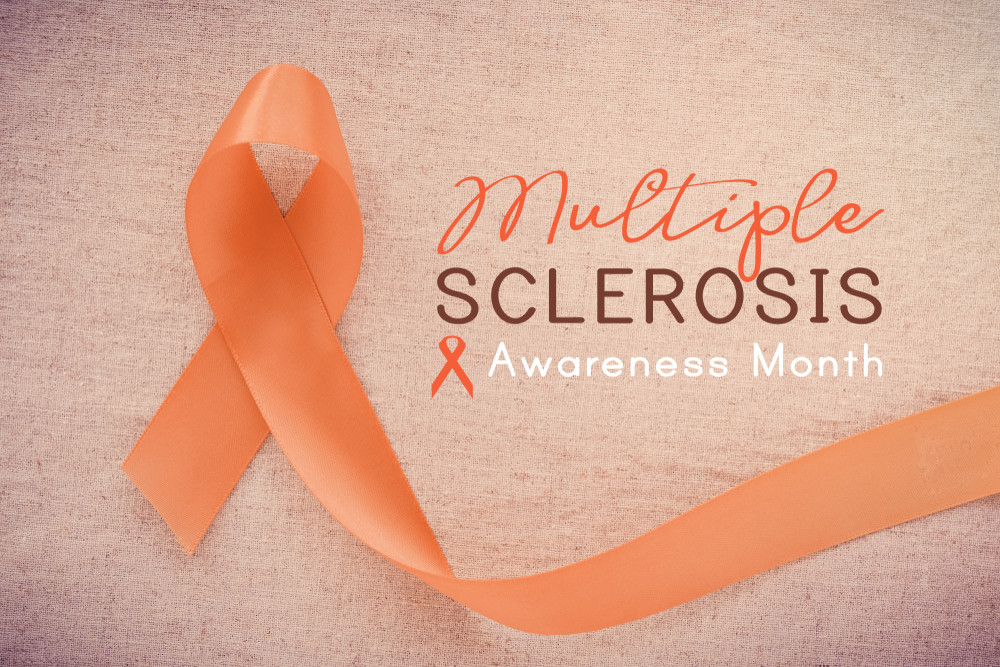Multiple Sclerosis (MS) Education & Awareness
Posted on: March 8, 2021

Many people have probably heard of Multiple Sclerosis (MS) but may not know what it is or how it affects people who have it. For March, we are shedding some light on Multiple Sclerosis, which is a disease that affects the brain and spinal cord. The immune system attacks the nerve fibers and myelin sheath in the brain and spinal cord. The attacks cause lesions to form on the brain and spinal cord, which interrupt the communication between the brain and parts of the body. This can cause deterioration of the nerves or cause permanent damage. It is estimated that nearly 1 million people in the United States are living with MS.
What Causes MS?
It is unknown exactly how MS develops and unclear why it develops in some people and not others. MS can develop at any age, but those with it received their diagnoses between 20 and 50 years old. It is believed that genetics and environmental factors play a role in developing the disease. According to the National Institute of Neurological Disorders and Stroke, 15% of people with MS have one or more family members that have the disease. Low Vitamin D and smoking cigarettes are environmental factors that increase the risk of the disease. Hormones may also be linked to MS as it is three times more common in women than in men. Since it is unknown how exactly MS develops, there is no information on how to prevent it.
MS Symptoms
The symptoms of MS vary from person to person. Some people may experience one combination of symptoms and another person may experience another. It also affects each person differently. Some people will have mild symptoms, where others may have more serious symptoms.
Common symptoms include:
- Vision problems, such as blurred, double vision, flashes of light with eye movement, involuntary eye movements, pain in the eyes, or vision loss.
- Fatigue
- Weakness
- Pain and itching
- Spasticity (stiffness, involuntary muscle spasms).
- Dizziness and vertigo
- Numbness or tingling
- Walking difficulties
- Bladder problems, such as urinating more frequently, difficulty urinating, and urinary tract infections (UTIs).
- Bowel problems, such as bowel incontinence and constipation.
- Sexual issues, such as low sex drive. For men, erectile dysfunction or issues ejaculating. For women, vaginal dryness, little to no sensation, and difficulty reaching orgasm.
- Emotional changes, such as mood swings, irritability, uncontrollable laughter, or crying.
- Depression
- Cognitive changes
These symptoms are less common but possible:
- Impaired hearing or hearing loss
- Speech issues, such as slurring words, loss of volume, or stuttering
- Difficulty swallowing
- Breathing problems
- Seizures
- Tremor
Treatment
There is not a specific test to diagnose MS. A neurological examination and tests, such as blood tests, evoked potentials, spinal fluid analysis, and/or an MRI need to be performed to be diagnosed. Once diagnosed, there are medications, injections, and infusions available to help with symptoms. Unfortunately, there is currently no cure for MS.
Multiple Sclerosis (MS) is the most common neurological disorder. MS may have a small impact on some people allowing them to live a normal life, but for others, it can be disabling. It is a condition that stays with you for life, but it is not considered a terminal illness. Most people with MS live long lives, but on average they live six years less than those who do not have MS. Modern medicine has helped make treatments more successful and provides hope for future breakthroughs.




